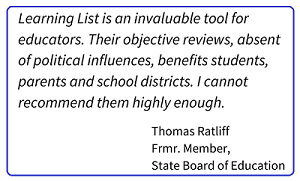This weekend, while I was walking with a teacher friend (keeping an appropriate social distance and wearing our masks), I asked how she is managing teaching her second grade class. She said she misses seeing her students every day, and lamented that she has had to rely on district-provided online materials a lot more than she ever did in the past. I asked her how well she liked using the online materials. The materials, she explained, use games to teach, and while her students found them engaging, she feared that the materials are not well aligned to the standards. I asked whether her district had reviewed the materials before she used them. She responded, “I doubt they had the time.”
Then yesterday, ironically, a friend shared a link to this Dallas Morning News editorial, “Who’s vetting the apps and websites kids are using for school?” The editorial argues that the State should be reviewing the materials districts are using for remote/distance learning. While we certainly agree that the materials districts use should be carefully reviewed, we, at Learning List, do not agree with the conclusion that this is a job for the State. Here’s why.
For just over seven years, Texas school districts have had access to Learning Learning List’s independent, evidenced-based reviews of PreK-12 instructional materials. Like Consumer Reports®, Learning List is a subscription-based instructional materials review service for school districts. An annual subscription costs districts approximately $1 per student or less. Subscribing districts get access to thousands of published reviews and can request reviews of additional materials, for free. Thus, the most widely used materials are reviewed. Many school districts in Texas and across the country have subscribed to this service when they have needed it.

Learning List has reviewed thousands of materials by more than 185 publishers, including textbooks and many of the online apps and instructional “websites” districts are turning to in this time of crisis.
For each material, we provide three distinct, evidence-based reviews:
- Alignment Report: a review of the material’s alignment to each state standard for the subject and grade level;
- Editorial Review: a review of the material’s instructional quality to help districts select materials that will support their students’ learning needs; and
- Spec Sheet: a review of the material’s technology compatibility and inter-operability to help districts make sure that they do not select a material that will not work on the district’s devices or operating systems.
Products are reviewed sequentially by multiple experienced, certified educators. Thus, no review reflects just one educator’s opinion. Reviewers review products that are within their area of certification and are aligned to standards they have taught. For example, only Texas educators review materials aligned to the Texas standards. The reviewers work under the supervision of Learning List’s Directors who are highly experienced former school district curriculum directors.
Learning List is independent of publishers. Publishers do not pay Learning List to review their products, and Learning List’s does not hire anyone who has worked for a publisher for at least two years prior to applying for a position as a reviewer, and they cannot work for a publisher while they are a member of Learning List’s team.
As the editorial advocates, the State also reviews instructional materials. For decades, the State has reviewed the alignment to state standards of core materials that are submitted for state adoption. Three years ago, the Legislature passed a law requiring the Texas Education Agency (TEA) to review the quality of those materials, as well. Districts are paying $2 per student for the state’s quality reviews, which TEA automatically withdraws from the state funds districts use to purchase instructional materials and/or technology.
So, in answer to the question, “Who is vetting the textbooks, apps and websites school districts are using?” both Learning List and the State are. Learning List has reviewed many more materials, provides three reviews (alignment, quality and technology compatibility) of each material, and costs districts 50% less than the state’s reviews. Furthermore, districts can subscribe to Learning List on an as needed basis, which makes it a fiscally efficient option. Lastly, like Consumer Reports ®, Learning List is a private company, independent from publishers and free from the political influences that have sometimes infiltrated the state’s review process.
